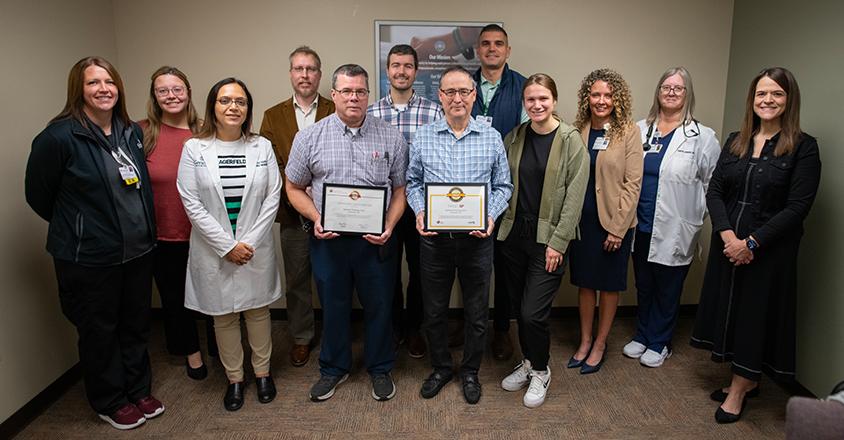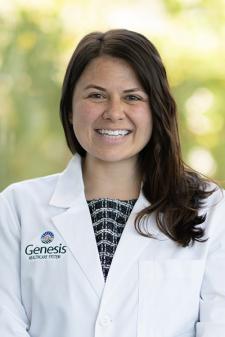Organize your space and your mind
Do you feel that your mind is in different places throughout the day? For example, it feels like you cannot focus on one task at a time. Look at the environment around you. Is it clean or messy? If you said messy, your brain could be affected by your environment, which can make you feel unorganized.
It can be overwhelming to look at the environment around you and know where to start. Take it little by little. According to Well.org, you can start organizing your space by:
Starting with one area of the room.
Taking everything out of drawers and off shelves so you can easily see everything.
Making separate piles and deciding where each item will go.
Typically, there are three piles labeled as Keep, Donate or Throw Away.
Designate a spot for every item in the Keep pile. Make sure to do your best to return it after every use.
There are long term benefits to staying organized. According to PIH Health, the health benefits of being organized include:
Feeling less stress
Sleeping better
Feeling happier
Taking better care of yourself
Enjoying better relationships
Organization can benefit us in so many ways.
For more self-care tips, you can read about:
-
 Long term strategies for managing panic attacks
Long term strategies for managing panic attacksPanic attacks are stressful, and nobody wants to experience one. To help reduce them, try these tips.
Learn more -
 5 simple steps to boost your confidence
5 simple steps to boost your confidenceHere’s a straightforward guide to boosting your confidence, and no superhero cape is required.
Learn more -
 Find the best you by replacing bad habits
Find the best you by replacing bad habitsHabits are easy to continue, which is why they are habits. With a little effort and solid strategies, you can change them.
Learn more
Ready to get healthy?
Sign up for our digital newsletters to receive health tips, recipes, success stories for inspiration and information about new doctors to help you on your journey to better health.
Genesis HealthCare System’s Health and Wellness content conveniently provides accurate and helpful information. Your health history and current health may impact suggestions provided through our Health and Wellness content. Although we hope this information is helpful, it is not a substitute for your doctor's medical advice. Before making any significant changes, please consult your doctor.

Your brain could be affected by your messy environment, which can make you feel unorganized. Get organized with these helpful tips.
Healthy holiday recipes
The holiday season is almost here. Stay on track with your wellness goals and get inspired with our recipe book. You'll find recipes for mashed cauliflowers, roasted brussel sprouts, cranberry sauce, crustless pumpkin pie and an orange cranberry mimosa mocktail. May this holiday season bring light into your heart and home.

Stay on track with your wellness goals and get inspired with our recipe book.
We’re here to help you get the care you need
Medicare Advantage plans in 2026.
Sleep like you mean it
Why your body isn’t a night owl with a steaming subscription
You know that thing where you stay up past midnight watching videos of raccoons talking to each other? And then you wake up six hours later wondering why you feel like you were hit by a bus full of anxiety? That, my friend, is your sleep cycle waving a white flag.
According to the National Institutes of Health, most adults need 7 to 8 hours of sleep each night, and not just any sleep. They mean consistent, quality sleep that doesn’t involve scrolling through your phone until your eyes water.
Consistency is key. Your body thrives on routine. It’s basically a cat with a planner. The Sleep Foundation explains that going to bed and waking up at the same time each day helps regulate your internal clock, also known as your circadian rhythm. That rhythm controls everything from hormone release to mood to your ability to not cry when the coffee runs out.
So, what can you do?
Start by creating a calming bedtime routine. That means dim the lights, put away the phone, and maybe read a book. No, social media videos do not count as literature. Try to keep your sleep and wake times consistent, even on weekends. Yes, this includes Sunday morning when your bed feels like a cloud woven by angels.
Bottom line. Your body is not a spontaneous party animal. It likes schedules. Treat your sleep like an important meeting with yourself, because technically, it is. And the raccoon videos? They’ll still be there tomorrow.
Ready to get healthy?
Sign up for our digital newsletters to receive health tips, recipes, success stories for inspiration and information about new doctors to help you on your journey to better health.
Genesis HealthCare System’s Health and Wellness content conveniently provides accurate and helpful information. Your health history and current health may impact suggestions provided through our Health and Wellness content. Although we hope this information is helpful, it is not a substitute for your doctor's medical advice. Before making any significant changes, please consult your doctor.

Most adults need 7 to 8 hours of sleep each night, and not just any sleep. It should be consistent, quality sleep that doesn’t involve scrolling through your phone.
Genesis Primary Care received two American Heart Association awards
Genesis Primary Care recently received two awards from the American Heart Association (AHA) for its commitment to delivering high-quality care in blood pressure and diabetes management.
The practice earned the 2025 Target: BP Gold+ award, the highest recognition level, for blood pressure control among adult patients. In addition, Genesis Primary Care received the 2025 Target: Type 2 Diabetes Gold award, which honors practices for excellence in diabetes care, including A1C control and adherence to cardiovascular-focused clinical guidelines.
“These awards reflect our continued dedication to improving the health of our community,” said Kevin D. Frank, M.D., FAAFP, Medical Director, Genesis Primary Care. “We’re proud to provide care that not only meets national standards but also positively impacts the lives of our patients every day.”
Providing exceptional chronic disease management requires a coordinated effort among physicians, advanced practice providers, nurses and support staff across Genesis Primary Care. To learn more about primary care services at Genesis, visit Genesishcs.org/services-search/primary-care.

Recognized for Excellence in Blood Pressure and Diabetes Management
AED Loaner Program

AED Loaner Program
Hosting an event? Be ready for a heart emergency.
Borrow a free AED from Genesis HealthCare System
You want your event to be fun, memorable and safe. What happens if someone has a heart emergency?
That’s where Genesis HealthCare System can help.
We’ll loan you an AED (Automated External Defibrillator) for free and show you how to use it, so you can be ready to act when seconds matter. Together, we can keep your guests safe.
Program details:
- Free to borrow for up to one week if conditions are met
- Available for events in Muskingum, Coshocton, Perry, Guernsey, Noble and Morgan counties
- Pickup and drop-off at Genesis Hospital in Zanesville
- First come, first served, so please request in advance
For questions and to reserve, call 740-455-7571.
What happens if someone has a heart emergency at your next event? Borrow a free AED from Genesis HealthCare System so you can be ready to act when seconds matter.
Sneaky signs you’re sitting too much
Let’s face it, we’ve all been there. You stand up to make coffee, only to sit back down with the mug, the laptop and yes, maybe even your cat. Sitting too long can sneak up on you like a ninja. Here are the clues that you have officially become one with your chair:
1. Your legs and glutes have gone AWOL
Yes, those muscles are still alive … somewhere … but all the squats you skip are conspiring to weaken them. As the National Library of Medicine notes, exercising your legs and glutes is important so they do not become weak and unable to perform the necessary steps for a healthy life. Steps, did you catch that?
2. Your waistline is staging a hostile takeover
Your “active metabolism” called and said it quit. According to MedlinePlus, an inactive lifestyle shoos away muscle strength, burns fewer calories and makes weight gain feel less optional and more inevitable.
3. Your posture looks like a question mark
Rounded shoulders, forward head, general limp-noodle vibe. Blame it on too much chair time. The Victorian health site highlights that long periods of sitting mess with posture, weaken core muscles, and lead to back pain and jarring muscle imbalances.
4. You’re feeling depressed
The connection between sitting too much and depression is not clear, but according to the Better Health Channel, the risk of anxiety and depression is higher among people who sit more.
5. Your heart and metabolism are quietly staging a revolt
Urgent warning: prolonged sitting increases your risk of heart disease, diabetes, cancer and early death. The Centers for Disease Control and Prevention (CDC) underscores how such sedentary behavior, independent of exercise habits, dramatically raises the risk of chronic diseases like cardiovascular disease, diabetes, obesity and more.
So, what now?
Next time your legs forget what walking feels like, maybe it’s time to stand up (literally), shake things up with some stretches or even a five-minute walk. Your glutes and your heart will send you a thank-you note.
Ready to get healthy?
Sign up for our digital newsletters to receive health tips, recipes, success stories for inspiration and information about new doctors to help you on your journey to better health.
Genesis HealthCare System’s Health and Wellness content conveniently provides accurate and helpful information. Your health history and current health may impact suggestions provided through our Health and Wellness content. Although we hope this information is helpful, it is not a substitute for your doctor's medical advice. Before making any significant changes, please consult your doctor.

Here are the clues that you have officially become one with your chair.
Genesis HealthCare System Earns “A” Hospital Safety Grade
The Leapfrog Group national award demonstrates commitment to patient safety
Genesis HealthCare System earned an “A” Hospital Safety Grade from The Leapfrog Group, an independent national nonprofit watchdog focused on patient safety. Leapfrog assigns grades to hospitals across the country using evidence-based measures of patient safety focused exclusively on errors, accidents, injuries and infections.
“Our team is committed to providing high-quality healthcare,” said Scott Wegner, M.D., Chief Medical Officer, Genesis HealthCare System. “Earning an ‘A’ grade for Patient Safety from The Leapfrog Group reaffirms our efforts that benefit patients who rely on us to help them get well. We are pleased to be recognized for this achievement.”
The Leapfrog Hospital Safety Grade is the only hospital ratings program focused solely on preventable medical errors, infections and injuries in the United States. This program is peer-reviewed, fully transparent and free to the public. Grades are updated twice annually, in the fall and spring.
About The Leapfrog Group
Founded in 2000 by large employers and other purchasers, The Leapfrog Group is a national nonprofit organization driving a movement for giant leaps for patient safety. The Leapfrog Hospital Safety Grade, Leapfrog's other main initiative, assigns letter grades to hospitals based on their record of patient safety, helping consumers protect themselves and their families from errors, injuries, accidents and infections.

Genesis HealthCare System earned an “A” Hospital Safety Grade from The Leapfrog Group, an independent national nonprofit watchdog focused on patient safety.
Hay, Anna V.
955 Bethesda Drive
1st Floor
Zanesville, OH 43701
United States
Anna Hay, M.D., joined the Genesis Heart & Vascular Group, specializing in general cardiology. She completed her cardiovascular medicine fellowship at The Ohio State University, Columbus, Ohio, and her internal medicine residency at the University of Virginia, Charlottesville, Virginia. Dr. Hay earned her medical degree from the Lewis Katz School of Medicine at Temple University, Philadelphia, Pennsylvania, and holds a bachelor of science in biology from the University of North Carolina at Chapel Hill, North Carolina. Her clinical and research interests include cardiovascular disease prevention, cardiac CT imaging and women’s heart health.
Cardiovascular medicine
The Ohio State University
Columbus, Ohio
Lewis Katz Temple School of Medicine
Philadelphia, Pennsylvania
Internal medicine
University of Virginia
Charlottesville, Virginia

Anna Hay, M.D., joined the Genesis Heart & Vascular Group, specializing in general cardiology.